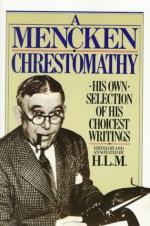
|
| Name: _________________________ | Period: ___________________ |
This test consists of 15 multiple choice questions and 5 short answer questions.
Multiple Choice Questions
1. Why is Mencken unable to embrace democratic political theory, as he himself states it in Chapter 9?
(a) He is incapable of being envious of others.
(b) He is not poor, and so cannot see democracy's benefits.
(c) He is simply too cultured and sophisticated.
(d) He is morally superior to democrats.
2. What is the proper function of punishment for crimes?
(a) As a deterrent only.
(b) As a mere incentivizing device.
(c) To create a sense of false dignity in society.
(d) As a deterrent, but also more.
3. What is Mencken's belief about morality?
(a) Morality is necessary.
(b) Morality is reserved only for the aristocracy.
(c) Morality is a made-up concept that doesn't exist.
(d) Morality is unnecessary.
4. Which is NOT one of the reasons Mencken praises George Washington?
(a) He scorned foreign entanglements.
(b) He enjoyed whiskey.
(c) He was a pious man.
(d) He ignored the private morals of his neighbors.
5. What comparison does Mencken make between man and animal in Chapter 1?
(a) The faculties of animal and man precisely balance when taken as a whole.
(b) Man in every way has faculties that are superior to animals.
(c) Many animals have superior faculties to man.
(d) The only thing man cannot do that animal can is fly.
6. What kind of people are most often forgotten by historical records, per Chapter 12?
(a) Respectful and intelligent men.
(b) Courageous women.
(c) The commoners.
(d) Great warriors.
7. What does the "believer" type of person inevitably do?
(a) Thinks they are better than everyone.
(b) Betrays friends as well as lovers.
(c) Maintains a faith in the improbable.
(d) Annoys the company he or she is with.
8. Before democracy came to be, what did people believe this system of government to be?
(a) A wretched form of government that should not come to pass.
(b) A heavenly form of government.
(c) It was such a foreign concept, no one could really imagine it.
(d) They believed democracy was just another form of dictatorship.
9. What is the chief problem with political theorists?
(a) They have little sense of history.
(b) They attempt to dignify the political order of their day.
(c) They hate politics in general.
(d) They are too antagonistic to the current political system.
10. Which politician does Mencken refer to as "a good man in a bad trade"?
(a) George Washington.
(b) Abraham Lincoln.
(c) William Jennings Bryan.
(d) Grover Cleveland.
11. How did morality come to be, according to Mencken?
(a) Morality is the product of the woman's insidious influence over man.
(b) Morality evolved from social practices required to survive.
(c) Morality is a creation of the Christian church.
(d) Morality evolved from the innate sense of right and wrong in children.
12. Mencken compares Theodore Roosevelt's political ideas to which other politician's?
(a) Germany's Kaiser.
(b) England's Queen.
(c) A Japanese feudal lord.
(d) The United State's William Jennings Bryan.
13. Mencken sees that too often any discussion of suicide is rooted in what incorrect notion?
(a) Death is painful.
(b) Killing oneself is an expensive proposition.
(c) The family would suffer in a suicide.
(d) Death is painless.
14. What does the "metaphysical" type of person inevitably do?
(a) Tips their hat for no reason.
(b) Begs for spare change.
(c) Becomes paralyzed with fear over the enormity of the universe.
(d) Demands to know what you mean, even when it is obvious.
15. What is the "altruist" motivated by?
(a) A divine inspiration.
(b) Being uncomfortable with unhappy people around him or her.
(c) Out and out greed.
(d) A selfish sense of self-worth.
Short Answer Questions
1. What is the relationship between Anglo-Saxons and civilization?
2. What does Mencken NOT believe about the possibility for morality to change over time?
3. How has Mencken organized his book?
4. How does Mencken characterize a woman's level of civility?
5. How would George Washington fare in today's political climate?
|
This section contains 726 words (approx. 3 pages at 300 words per page) |

|




